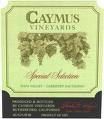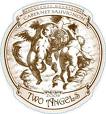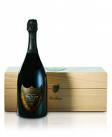A wine journalist’s work is never done. There are tastings and travel, travel and tastings, tastings and more tastings, until you come to think there must be an ocean of wine out there and we’re never gonna run out of the stuff. There is and we won’t.
So it’s a journey, and along the way, quite a bit of interesting clutter accumulates in the notebook, anecdotal evidence of profound trends begging to be revealed. I would like to think so, at least.
 To begin, I am told by a number of wine retailers that the economy has forced the fabled Napa Valley winery Caymus to steeply discount its top wine, Caymus Special Selection Cabernet Sauvignon, from a wholesale price above $100 per bottle to about $65 (in California, at least).
To begin, I am told by a number of wine retailers that the economy has forced the fabled Napa Valley winery Caymus to steeply discount its top wine, Caymus Special Selection Cabernet Sauvignon, from a wholesale price above $100 per bottle to about $65 (in California, at least).
That means you might shortly see the Special Selection cab on retail shelves for less than $100 a bottle, discounted about $70 per bottle from recent years. The discounts on iconic Napa Valley wines such as Special Selection are applying downward pressure on less expensive California cabs because the big boys are now dropping their prices into the territory occupied by cabs at the lower echelons.
The nationally "suggested retail" prices that typically accompany Wine Talk reviews are rendered somewhat meaningless until prices stabilize, but remain useful in the sense that they will help you spot the bargains at the high end should you be inclined to splurge. Thus I have recommended a number of pricy red wines this week confident that you might be able to find some of them well below the listed price.
 — A winery to watch is Napa’s Artesa, a beautiful property located in the hills of the northern Carneros district. A winemaking change has delivered the brilliant Mark Beringer (formerly of Duckhorn and Raymond) to Artesa, and changes are afoot. The Artesa wines (pinot noir, chardonnay, cabernet sauvignon and merlot) have always been of high quality and a good bang for the buck, but you can expect Beringer to kick it up a notch. He’s already changed the way Artesa handles incoming grapes, moving toward the gentler gravity flow method of production — a natural since the winery is built into a hillside and the grape receiving area is at the top of the hill. He also backed off on the use oak with the 2008 chardonnay (Beringer arrived in December) in an effort to move Artesa chard toward a cleaner, more elegant style with emphasis on fruit complexity and fresh acidity. And he is chomping at the bit to ramp up the merlot and sauvignon blanc programs, which is natural considering his Duckhorn background.
— A winery to watch is Napa’s Artesa, a beautiful property located in the hills of the northern Carneros district. A winemaking change has delivered the brilliant Mark Beringer (formerly of Duckhorn and Raymond) to Artesa, and changes are afoot. The Artesa wines (pinot noir, chardonnay, cabernet sauvignon and merlot) have always been of high quality and a good bang for the buck, but you can expect Beringer to kick it up a notch. He’s already changed the way Artesa handles incoming grapes, moving toward the gentler gravity flow method of production — a natural since the winery is built into a hillside and the grape receiving area is at the top of the hill. He also backed off on the use oak with the 2008 chardonnay (Beringer arrived in December) in an effort to move Artesa chard toward a cleaner, more elegant style with emphasis on fruit complexity and fresh acidity. And he is chomping at the bit to ramp up the merlot and sauvignon blanc programs, which is natural considering his Duckhorn background.
 — One of the best new wine brands in recent years has been Two Angels wines made by Bob Pepi. The Two Angels standard bearers are a petite sirah and a sauvignon blanc from the Shannon Ridge vineyard in Lake County, just north of the Napa Valley. Unlike most other mountain vineyards in California, Shannon Ridge is truly a hillside vineyard in the manner that Europe knows hillside vineyards in viticultural areas such as the northern Rhone or the Duero Valley. Planted on a steep 45-degree angle, this vineyard has naturally low yields and delivers gorgeous fruit, which Pepi crafts into superb petite sirah and sauvignon blanc at less than $20 a bottle. Don’t be fooled by the screwcap closure. These are serious wines from a fabulous vineyard at very good prices given the quality in the bottle.
— One of the best new wine brands in recent years has been Two Angels wines made by Bob Pepi. The Two Angels standard bearers are a petite sirah and a sauvignon blanc from the Shannon Ridge vineyard in Lake County, just north of the Napa Valley. Unlike most other mountain vineyards in California, Shannon Ridge is truly a hillside vineyard in the manner that Europe knows hillside vineyards in viticultural areas such as the northern Rhone or the Duero Valley. Planted on a steep 45-degree angle, this vineyard has naturally low yields and delivers gorgeous fruit, which Pepi crafts into superb petite sirah and sauvignon blanc at less than $20 a bottle. Don’t be fooled by the screwcap closure. These are serious wines from a fabulous vineyard at very good prices given the quality in the bottle.
 — During this recession, Champagne sales have slipped dramatically in the United States. It has been reported, for example, that Moet-Hennessy’s sales are down 28 percent this year on its multiple brands that include Dom Perignon, Veuve Cliquot, Moet & Chandon and Krug. The authority that controls production in the Champagne region, in its infinite wisdom, has decided to limit the harvest this year in a move designed to protect Champagne’s high price points. I think I have a better idea: Lower the price, deplete the backed up inventory and make room for what was shaping up to be an exceptional harvest in Champagne. The current plan is nothing more than an attempt to manipulate the market as the Champagne houses did prior to the millennium celebration in 2000.
— During this recession, Champagne sales have slipped dramatically in the United States. It has been reported, for example, that Moet-Hennessy’s sales are down 28 percent this year on its multiple brands that include Dom Perignon, Veuve Cliquot, Moet & Chandon and Krug. The authority that controls production in the Champagne region, in its infinite wisdom, has decided to limit the harvest this year in a move designed to protect Champagne’s high price points. I think I have a better idea: Lower the price, deplete the backed up inventory and make room for what was shaping up to be an exceptional harvest in Champagne. The current plan is nothing more than an attempt to manipulate the market as the Champagne houses did prior to the millennium celebration in 2000.
And we all know how that turned out. It backfired big time!
8
